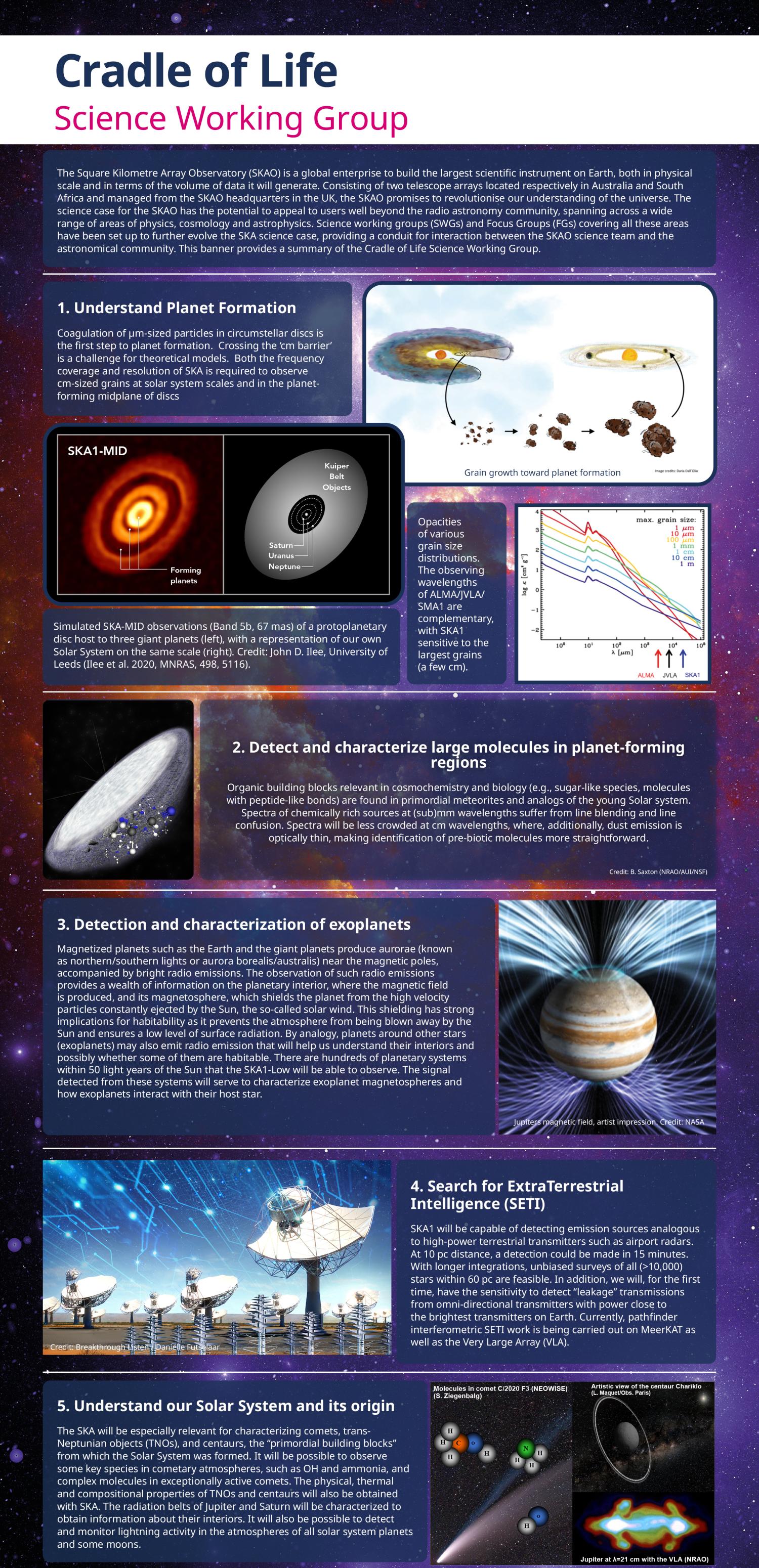Cradle of Life

This working group aims to understand how the SKA can be used to uncover the ‘Cradle of Life’ across the formation and evolution of stars & planets. The higher frequencies covered by SKA will enable observations of the earliest stages of the raw material for planet formation, and also allow deep searches for prebiotic molecules (such as amino acids) both within and beyond our solar system. The lowest frequencies can be used to detect and characterise magnetic fields around exoplanets via auroral radio emission. Across the full frequency range, SKA will also carry out systematic, volume-limited searches of exoplanet systems for signals from technologically advanced civilisations. These high impact research areas will answer some of the most fundamental questions in modern astronomy.

Working Group Membership
Members of the the CoL Working Group can be found here.
We actively encourage interested researchers to participate in the working group.
If you are interested in joining the group, please complete this form.
The current co-chairs are:
- Eleonora Bianchi (INAF - Osservatorio Astrofisico di Arcetri, Italy), eleonora.bianchi AT inaf.it
- Joe Callingham (ASTRON, The Netherlands), callingham AT astron.nl
Guidelines on who can join the group can be found here.
The SKAO science liaison is Tyler Bourke (contact details here).
CoL Working Group Documentation
The CoL chapters from “Advancing Astrophysics with the SKA” (2015) can be found here
CoL Webinars
2023 February:
The Breakthrough Listen Signal-of-Interest 'blc1': Analysis, Origin, and Lessons Learned
Sofia Sheikh (SETI Institute, USA)
Recording
2022 May:
Survey of young stellar objects in the Oph A cluster with the VLA
Audrey Coutens (IRAP Toulouse, France)
Recording
2022 January:
Assessing Habitability Through the Lens of Exoplanetary and Stellar Radio Emission: Extrasolar Space Weather Monitoring with the OVRO-LWA-352
Marin Anderson (JPL, USA)
Recording
2021 November:
Solar System science with the SKA
D. Bockelée-Morvan (Obs. Paris, CNRS); P. Santos-Sanz (Instituto de Astrofísica de Andalucía); P. Zarka (Obs. Paris, CNRS, Nançay Radio Observatory)
Recording
2021 October:
Planet-forming disks in the era of ALMA
Laura Pérez (Universidad de Chile, Chile)
Recording
2021 September:
Radio observations as a tool to unveil star-planet interaction in M-dwarfs
Miguel Perez-Torres (Instituto de Astrofisica de Andalucia, Spain)
Recording
2021 June:
Observing planetary auroral radio emission
Jake Turner (Cornell University, USA)
Recording
2021 May:
Breakthrough Listen MeerKAT SETI search
Cherry Ng (University of Toronto, Canada)
Recording
2021 April:
Observing protoplanetary disks with the SKA
John Ilee (University of Leeds, UK)
Recording
2021 February:
Radio stars and exoplanets at low-frequencies
Joe Callingham (Leiden University, The Netherlands)
Recording | Slides
2021 January:
From protostellar disks to planetary atmospheres with SKA: Back to cm-wavelengths with new perspective
Claudio Codella (Osservatorio Astrofisico di Arcetri – INAF, Firenze, Italy)
Recording
Previous Chairs
- Cherry Ng (2022-2024)
- John Ilee (2022-2024)
- Laurent Lamy (2020-2022)
- Josep Miguel Girart (2020-2022)
- Izaskun Jimenez-Serra (2017-2020)
- Doug Johnstone (2017-2020)
- Andrew Siemion (2015-2017)
- Di Li (2015-2017)
- Melvin Hoare (2013-2015)




